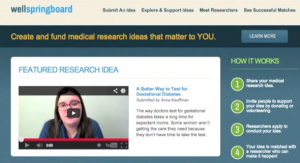In my second year working at Johnson & Johnson as a graduate fellow, I embraced an opportunity to be a member of the company’s newly formed social media team. I explored using digital media technologies and social media programs to directly engage patients and caregivers online. These explorations revealed to me how digital and social media, which was in its infancy in the healthcare arena, can offer life-changing opportunities to improve people’s health. Since that time, social media and digital technologies have dramatically reshaped the healthcare landscape.
In my second year working at Johnson & Johnson as a graduate fellow, I embraced an opportunity to be a member of the company’s newly formed social media team. I explored using digital media technologies and social media programs to directly engage patients and caregivers online. These explorations revealed to me how digital and social media, which was in its infancy in the healthcare arena, can offer life-changing opportunities to improve people’s health. Since that time, social media and digital technologies have dramatically reshaped the healthcare landscape. Today, more experiments have demonstrated that social media and digital technologies offer an innovative approach to tackling some of the most pressing public health issues, such as obesity.
A recent study published online in PLOS ONE discusses how data from Facebook can be utilized by pubic health workers for surveillance of obesity prevalence.
Researchers Rumi Chunara et al from Harvard School of Public Health found that higher proportion of the population with activity-related interests on Facebook was associated with a significant lower predicted prevalence of obese and overweight people across the United States metro areas as well as across New York City neighborhoods.

Prevalence of activity-related interests and obesity in the USA. (a) population prevalence of obese and/or overweight people (b) the proportion of the population with activity-related interests
The researchers examined activity and sedentary related interest categories from Facebook that have been positively or negatively related to obesity and compared the data against CDC’s Behavioral Risk Factor Surveillance System (BRFSS) and New York City EpiQuery Community Health Survey (CHS). They discovered activity-related interests on Facebook across the USA and sedentary-related interests across New York City were significantly associated with obesity prevalence.

Prevalence of television interests and obesity in New York City. (a) population prevalence of obese and/or overweight people (b) the proportion of the population with television-related interests
As the researchers pointed out, one of the study’s major implications is that it has demonstrated “a new method for understanding the relationship between an aspect of the social environment and a real world health outcome.” As discussions around “Big Data” continue to draw more attention from the healthcare community, this study shows us the potential value of harnessing social media data from a public health perspective.
So what can we do about the Facebook data?
For healthcare marketers, the most important value of Facebook is its super power to target: users can be identified by specific demographic characteristics, geographic information and interests, offering marketers effective data to reach relevant audiences via a variety of Facebook tactics. A similar approach should be adopted by public health workers. With findings from researchers like Chumara, interventions can be customized and precisely delivered via Facebook. For example, public health workers can use “Facebook Ads,” or “Sponsored Stories” that address obesity preventions to reach communities at high risk of obesity. Additionally, all Facebook activities can be proactively monitored in real-time, providing valuable feedback for public health workers to adjust interventions to maximize effects.
Further assessment of the data can also help address the major limitation of the study and offer more public health solutions. As Chumara mentions, a primary limitation of the study is that inferences are not made at the individual level, suggesting the aggregate relationship of the social environment to health outcomes in cities or neighborhoods may be different from situations for individuals. By analyzing the data more closely, we may be able to identify the social environment to obesity on an individual level and even discover the “obesity ecosystem” for communities at high risk based on Facebook data.
A study like this once again reminds us as the healthcare system is moving to an outcome-focused model, we need a new approach to the emerging tools driven by social media and digital technologies. Because of their many unique attributes, they offer potential opportunities for stakeholders in the healthcare community to discover.






